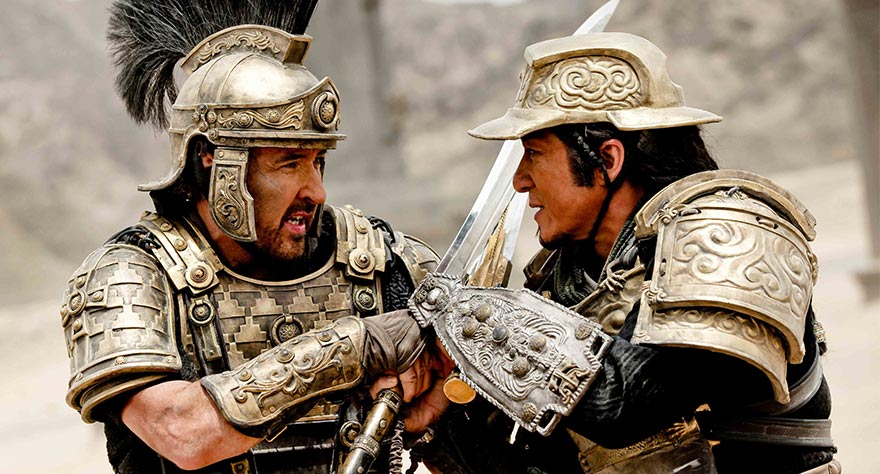
The strange combo of Chan, Cusack, and Brody intrigues but this frilly film is a blood-soaked PSA for world peace.

The strange combo of Chan, Cusack, and Brody intrigues but this frilly film is a blood-soaked PSA for world peace.
What is it about Jackie Chan that makes him the most lovable person on the planet? If you consider other action stars, like Sylvester Stallone, Jason Statham, Arnold Schwarzenegger or even Bruce Lee, they just don’t exude that same cheerful charisma that Chan has. If anyone could deliver some martial arts driven world peace, it’s him. And in his latest action epic, Dragon Blade, that’s exactly what his character, Huo An, wants to do.
Daniel Lee directs this grandiose spectacle of a historical action film and the ornate detail put into the visuals of the film are truly mesmerizing…and utterly distracting. Clearly Lee, who also wrote the film, is attempting to use the historical allure of the Silk Road and the mingling of cultures along that road to present a message of unity—no matter the rather loose historical accuracy of the events depicted or the bombast with which he presents it all. Dragon Blade is a thoroughly enjoyable film with laugh-out-loud moments, almost all of which I assume the director did not intend. The same slow motion glory with which the film’s final epic battle plays out also works to highlight every jowel-ripple moving across John Cusack’s face as he rides horseback. Proof positive that enhanced visual effects don’t always enhance a film’s quality.
Supposedly based on a historical person, Chan’s Huo An leads the Silk Road Protection Squad, peacekeepers of the Silk Road, whose mission is to prevent those many cultural clashes bound to happen on a busy trade road. In the film’s opening Chan hilariously faces off against the leader of one such clan, Cold Moon (Peng Lin), about to engage in a desert scuffle. Using fancy footwork and his forearm shield, he makes avoiding fighting this woman look amazingly intricate, showcasing that despite his age—61 and not quite doing all his own stunts anymore—Chan definitely still has it.
That crisis is averted but someone has it in for the Protection Squad and they are wrongly accused of corrupt practices and exiled to Goose Gate, a fortress along the Road in a state of disrepair. All the various cultures found in the area are represented, Hun, Indians, Turks, Mongols and more, and all are forced to work alongside each other to rebuild the city wall. Which of course leads to opportunity for the Protection Squad to use their training, albeit unappreciated by the others until the day a Roman army—led by John Cusack and his slow-mo’d jowels—shows up to invade. Huo An comes to the rescue, facing Roman leader Lucius (Cusack) in a sword fight and offering sanctuary when a sandstorm cuts their dual short.
In a rather quick turn of events, Lucius and Huo An form a sort of friendship. Lucius is traveling with deserted Roman army soldiers and a blind young Roman prince, Publius (played by Chinese child actor Jozef Waite turned blonde Roman and weirdly creepy), who is pursued by his tyrannical older brother Tiberius who has overthrown his own father and blinded his brother. In exchange for shelter and in preparation for Tiberius’s arrival, the Roman soldiers and workers of Goose Gate band together, using Roman technology to rebuild the city in a very short amount of time, and simultaneously learning the efficiency and joy of working as a team. If it wasn’t so elaborately shot and costumed, it would be a perfect fit for a Sesame Street segment.
Tiberius does indeed show up, clad in perfect Roman curls and played at his villanous best by Adrien Brody. The script shifts dramatically at this point, and after all the friendship-forming and singing—no, literally there is an extended scene where each of the different tribes sing the songs of their people and show their respects to one another—the sudden gruesomeness that ensues is dark indeed. Apparently that world peace Huo An seeks won’t happen without a fair amount of blood shed, all of which elicits laughs rather than gasps due to its over-the-top entrance into the film.
There is a satisfying showdown and large-scale battle to round out the film but once again the magnitude of it all detracts from any connection to the so-called story. Huo An remains the sole character for whom we hold any real connection, but the degree of his suffering hardly makes the battle feel worth winning. Strangely all criticism of Cusack or Brody has entirely to do with the writing material they were given and the silliness they are thrust into at moments. Amazingly, and this is of course a testament to Chan’s remarkable choreographic abilities, both men look completely at ease and totally tough in their fantastic fight scenes.
Any reason for seeing Dragon Blade lies firmly within a respect and adoration of Jackie Chan and relies on one’s ability to be patient waiting for the fight scenes. The film’s themes are as overt as a round-house kick to the face and no one who sees this film will be able to escape walking away feeling like they were subjected to the film equivalent of two hours on It’s a Small World—you know, but with blood and gore.
Jackie Chan fans can deal with the cheese that often accompanies the thrill of seeing the man in action, and those who like ornate flourishes may not mind the film’s style, but mostly this film’s biggest assets are the strange combo of Chan, Cusack and Brody and the accidental hilarity of a frilly film taking itself seriously. And perhaps there is a lesson in Dragon Blade after all. World peace may not equate to “good” guys winning over “bad” guys, or the people of the world combining in a united cause—it may simply be a matter of everyone getting over themselves and having a laugh.